Suspected Israeli Air Strike Hits Targets in Syria's Aleppo
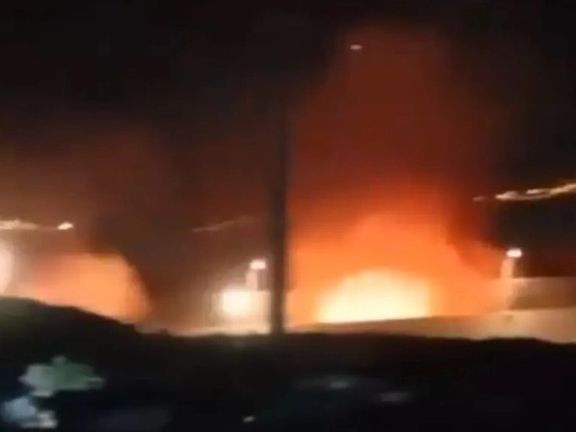
An unknown number of people were killed in an Israeli air attack targeting sites in the vicinity of the Syrian city of Aleppo on Monday, Syrian state media said citing a military source.

An unknown number of people were killed in an Israeli air attack targeting sites in the vicinity of the Syrian city of Aleppo on Monday, Syrian state media said citing a military source.
This was the second reported attack on the country in less than a week, following a string of air strikes since the October 7 Hamas invasion of Israel. Some sources said the targets were affiliated with Iranian-backed forces in the region. Israel usually does not comment about its air strikes in Syria.
The strikes at around 12:20 a.m. early Monday (2120 GMT on Sunday) "led to a number of fatalities and some material damage", the source said, without elaborating. Independent sources have not reported more details so far.
Israel launched air attacks on May 29 on Syria's central region as well as the coastal city of Baniyas, killing a child and injuring ten civilians, according to Syrian state media.
A devastating air strike on April 1 flattened a building in the Iranian diplomatic compound in Damascus, where two senior Revolutionary Guard generals and five other officers died. Reportedly, these individuals were involved in operations aimed at intensifying attacks on Israel. This led to a massive Iranian missile and drone retaliatory attack against Israel on April 13, which inflicted minimal damage. Most projectiles were shot down.
For years Israel has been carrying out attacks against what it has described as Iran-linked targets in Syria, where Tehran's influence has grown since it began supporting President Bashar al-Assad in the civil war that started in 2011.
The danger of a direct military confrontation between Iran and Israel has subsided since the April flareup, but the Iranian presence in Syria remains a challenge for Jerusalem.
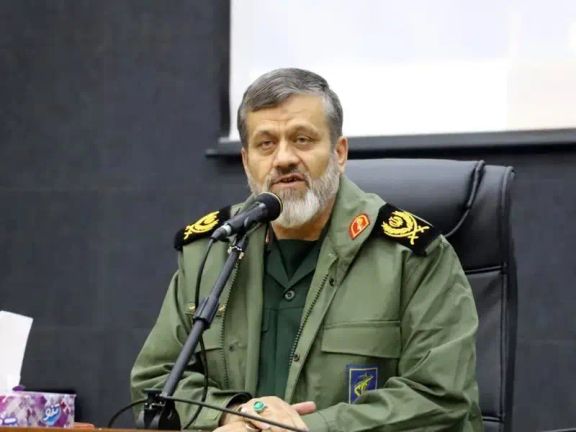
The IRGC's commander in Qazvin has made a bizarre claim that the United States had sent Iran a written message supporting its right to retaliate against Israel in spite of the two nations having no direct channels of communication.
Rostamali Rafiei Atani stated that Washington urged Tehran to "lower the level of revenge." The claims come in the wake of the US coming to Israel's aid after an unprecedented attack from Iran.
On April 13, Iran launched hundreds of explosive drones and missiles in retaliation for what Iran claims was an Israeli strike on its consulate in Damascus that killed seven IRGC officers. The US led a coalition of nations, including the UK, to support Israel in intercepting the majority of the 350 or more projectiles.
However, in the Sunday statement, Rafiei went on to say that "the Israelis and the British have sent messages saying they are ready to negotiate," while the British security services say Iran is one of the country's biggest foreign threats on its soil and Israel vows to do all it can to prevent Iran getting a nuclear weapon.
The Biden administration, however, rejected Rafiei's remarks on Sunday afternoon, telling the Washington Free Beacon that the remarks are "false" and such an exchange of message "did not happen."
This is not the first instance of an Iranian official making claims that cannot be independently verified. On Thursday, the IRGC-affiliated Tasnim news agency reported that Amirali Hajizadeh, a senior commander of the Revolutionary Guard, stated Israel had offered compromises in Gaza through communications mediated by Egypt's foreign minister to forestall further Iranian retaliation.
Despite the claims, the situation on the ground suggests otherwise. Israel has intensified its military operations into Rafah, the last Hamas stronghold in southern Gaza. The escalation persists even amid warnings from the International Criminal Court, as Israel continues its campaign to dismantle Hamas and secure the release of 125 hostages reportedly held in Gaza.
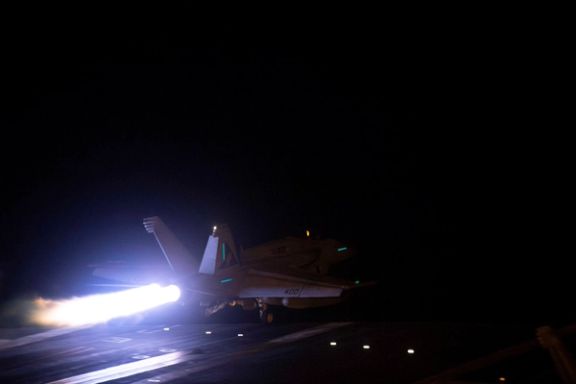
A British think-tank has claimed the UK should launch direct attacks on Iran after current international policy and sanctions have “failed spectacularly”.
According to The Henry Jackson Society, the West’s policy on Iran is “in tatters”. Iran continues to support Russia’s war on Ukraine, bolster its nuclear capabilities, fund, train and arm militias in the Middle East and most recently, target international shipping through its Yemeni proxy, the Houthis, in the Red Sea region.
The blockade, which the Houthis say is in allegiance with Iran-backed Hamas in Gaza amid its war with Israel, has seen the Houthis “taking hostages, seizing ships, firing missiles at US military vessels and firing missiles and drones at Saudi Arabia via Yemen”, according to the report.
Dozens of hostages hail from countries such as Mexico, Romania and the Philippines, though the Houthis allege they are targeting Israeli-linked vessels. However, that expanded to Western backed vessels after retaliatory attacks from a UK-US coalition directly attacked Houthi facilities in Yemen. Since last year, Iran has also ramped up its policy of diplomatic hostage-taking, including European diplomat Johan Floderus. In spite of this, President Joe Biden freed up $6bn of frozen Iranian funds in South Korea last year in exchange for the release of five US-Iranian hostages, only showing the success of Iran's policy.
“For too long, Iranian aggression has been unchallenged,” the report said, suggesting direct attacks on the likes of Iran’s drone and missile facilities which have been used to arm Russia in addition to Iran’s regional proxies, as well as targeting Iran’s air defences.
Its experts claim that the US should remove its carriers from the Persian Gulf, granting the US strike capability while insulating them from drones, mines and anti-ship missiles. It also suggests targeting Islamic Revolutionary Guard Corps (IRGC) bases such as the Pasdaran base and senior IRGC personnel on Iranian or foreign soil.
Since the Gaza war alone, sparked in October by Iran-backed Hamas’s invasion of Israel, over 200 attacks on US facilities in the Middle East as punishment for supporting Israel’s right to defend itself, have all but passed with no response. Just a handful of retaliatory attacks have been launched, none of which touched Iran directly.
“Even when the US has been directly targeted by Iranian proxies, successive administrations have refused to respond directly to Iran and hold the regime accountable,” the report stated, attacks happening in the likes of Iraq and Yemen, with three US forces killed in Jordan, 47 others wounded.
Taking a softly softly approach, pursuing diplomatic means and secret, though indirect, talks instead of military options, “the strategy was to localise conflict, avoid regional escalation and prevent broader war from breaking out in the Middle East. Ironically, it has led to the exact opposite. By attempting to prevent war, the US has encouraged conflict to erupt,” said the report.
Targeting Iran's nuclear program is essential, claims the think-tank. Under the Biden administration, Tehran has only continued to become more emboldened, escalating its nuclear enrichment, in spite of sanctions, even blocking access to the UN's inspectors. UN nuclear chief, Rafael Grossi, recently said Iran is now weeks, not months, away from a nuclear weapon.
While Iran continues to bypass sanctions, selling oil to countries such as China, the think tank also suggests targeting Iran’s oil infrastructure, including refining and processing facilities, domestic distribution pipelines and terminals, and the hydrocarbon export ports.
State-backed plots to assassinate Israelis and Jews abroad continue to be seen from South America to Europe, including the UK’s national security agency, MI5, calling Iran one of the biggest foreign threats on UK soil. Just days ago, Israel’s intelligence agency, Mossad, revealed plots across Europe targeting Israeli embassies.
Multiple Iran International journalists have also been targeted in assassination attempts in the UK. Most recently, journalist Pouria Zeraati, was stabbed in public on a London street, as targeting Iranian dissidents in exile becomes ever more brazen policy from the regime.
The Henry Jackson Society report also calls for a “new policy towards Iran” which would involve Israel “expanding its projection of power to target Iranian facilities on Iranian soil, and could be accompanied by the US conducting disproportionate responses to destabilise the Iranian regime with the effect of paradoxically restoring deterrence”.
After an alleged Israeli airstrike on the Iranian consulate in Syria in April, targeting senior military figures at what has been claimed is a consulate covering as a military facility, Tehran launched its first direct assault on Israel.
Over 350 projectiles were launched towards the Jewish state, with Israel and a US-led coalition intercepting the majority. However, there was no international military action against Iran for the attack which risked the beginnings of a third world war, with Biden only putting distance between the US and Israel after the event, warning Israel it would not be involved in further action.
But it is not only Biden who has come under fire for being too soft on Iran. Last week, a group of over 550 British MPs and peers joined forces to call for the proscription of Iran’s Revolutionary Guard as unlike the US, the UK resists designating Iran’s state-backed terror force in favor of ‘diplomatic means’.
Tory MP Bob Blackman said: “We have tried the current policy of appeasement for 40 years, and it has only resulted in failure after failure, simply emboldening the regime in intensifying its nefarious conduct.
“It should be coupled with holding the regime accountable, including by designating the IRGC as a terrorist entity, a step long overdue. That would send a clear message to the ayatollahs that business as usual is over and would signal to the brave Iranians that the West has started to be on their side.”
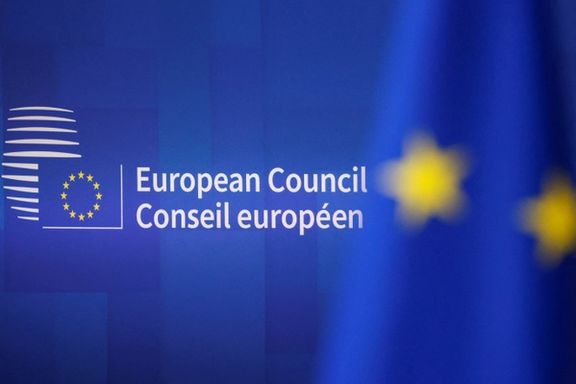
The EU Council has sanctioned six Iranian people and three entities for involvement in Tehran’s UAV program,supplying Russia for its invasion of Ukraine or armed groups in the Middle East and Red Sea region.
Sanctioned individuals include Iran’s Defense Minister Mohammad-Reza Gharaei Ashtiani; Commander of Revolutionary Guards' extraterritorial Qods Force Esmail Qaani; Afshin Khaji Fard, who heads the Iranian Aviation Industries Organization (IAIO); Kavan Electronics Behrad LLC CEO Mehdi Dehghani Mohammadabadi;its board chair Hossein Hatefi Ardakani; and Gholam Ali Rashid, the commander of the Khatam al-Anbiya Central Headquarters.
The entities listed in the new measure are the IRGC Navy, IRGC’s Khatam al-Anbiya Central Headquarters, and Kavan Electronics Behrad LLC, which procures and sells components for manufacturing UAVs.
The European Council also strongly and unequivocally condemned the Iranian attack on Israel and affirmed its full solidarity with the people of Israel and commitment to Israel's security and to regional stability.
The Council also called on Iran and its proxies to cease all attacks that have escalated following Hamas October 7 attack on Israel that sparked the current Middle East conflict.
“The European Council stated that Russia’s access to sensitive items and technologies with battlefield relevance must be restricted to the maximum extent possible, including by targeting entities in third countries enabling the circumvention of sanctions.”
The European Council also called on the High Representative of the Union for Foreign Affairs and Security Policy and on the Commission “to prepare further sanctions, notably on Iran.”
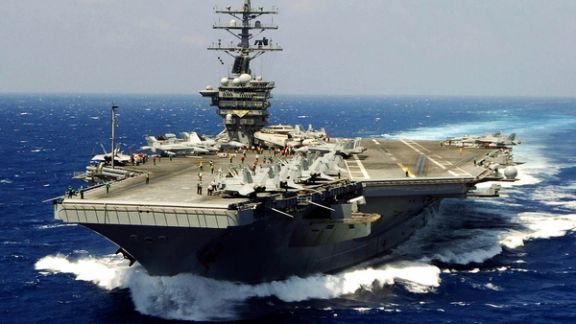
Yemen's Houthis launched a missile attack on the US aircraft carrier Eisenhower in the Red Sea in response to US and British strikes on Yemen, Houthi military spokesperson Yahya Saree said on Friday.
Six US and British strikes have killed 16 people and wounded 41, including civilians, Saree said in a televised statement.
Strikes on the province of Hodeidah targeted the port of Salif, a radio building in Al-Hawk district, Ghalifa camp and two houses, Saree said.
The US and British militaries said they launched strikes against Houthi targets in Yemen on Thursday to deter the militant group from further disrupting shipping in the Red Sea.
The US Central Command said American and British forces had hit 13 targets in Houthi-controlled areas of Yemen.
The British defense ministry said the joint operation targeted three locations in the Red Sea port city of Hodeidah, which it said housed drones and surface-to-air weapons.
"As ever, the utmost care was taken in planning the strikes to minimize any risk to civilians or non-military infrastructure," the British defense ministry said.
"Conducting the strikes in the hours of darkness should also have mitigated yet further any such risks."
Houthi spokesperson Mohamed Abdelsalam said the strikes were a "brutal aggression" against Yemen as punishment for its support of Gaza.
In Tehran, Houthi-allied Iran condemned the strikes as "violations of Yemen's sovereignty and territorial integrity..., international laws and human rights", Iranian state media reported.
"The aggressor US and British governments are responsible for the consequences of these crimes against the Yemeni people," Iranian foreign ministry spokesperson Nasser Kanaani said.
The Houthis, who control Yemen's capital and most populous areas, have attacked international shipping in the Red Sea since November heeding a call by Iran’s Supreme Leader Ali Khamenei to blockade Israeli trade, drawing retaliatory US and British strikes since February.
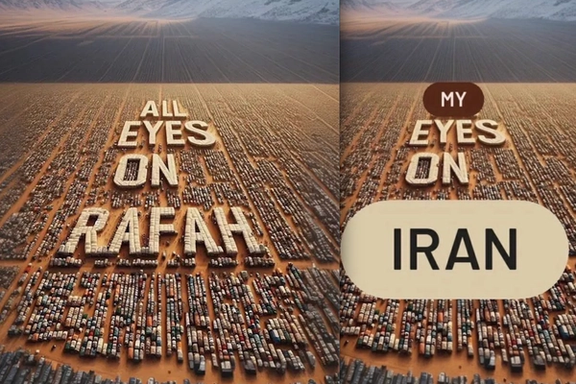
A pro-Palestinian social media campaign using an image with the text ‘All Eyes on Rafah’ has raised huge controversy among Iranians. Those who oppose the campaign have launched their own ‘All Eyes on Iran’ version.
The AI generated image of tents in a camp of displaced Gazan Palestinians arranged to read ‘All Eyes on Rafah’ turns the spotlight on the situation of the Palestinians who have been displaced after Israel’s deadly offensive.
The image which was created and shared as an Instagram ‘story’ template by a Malaysian Instagrammer named Shahv4012 has been shared by nearly 45 million users of the platform including some Iranian hardliners. The campaign has also found its way to other platforms such as X.
Activists and social media users opposing the campaign argue that Hamas is directly responsible for the war in Gaza and the deaths of Palestinian civilians and children, whom it uses as 'human shields.' They are part of a large segment of Iranians who say their own people have been suffering under the repression of the Islamic Republic, which also supports and arms Hamas with their money.
“It is Hamas that has forced Israel to go to war, with heinous crimes against Israeli civilians. It wants to force Israel to end the war using the civilian card, now that it is on the verge of destruction. My anger and curses over the killing of Palestinian children are all directed at Hamas terrorists,” journalist Sheragim Zand said in a tweet May 29.
All Eyes on Rafah posted by a student Basij militia group in Iran's Sistan and Baluchestan
“Defending Israel is defending morality,” another opponent, pro-monarchy activist Ali Ashtari, tweeted.
Ashtari argued that the only way for Israel to eliminate the threat of Hamas is a military one. “But unfortunately, a military attack, especially in the densely populated area of Gaza, causes civilian casualties too,” he maintained while accusing Hamas of intentionally seeking higher civilian casualties to force the international community to stop Israel’s military operations.
Another expatriate journalist, Neda Sanji, however, in her tweets warned about “fake news and fallacies” which she listed as “opposing the massacre in Gaza equals support for the Islamic Republic”, “Those who oppose the Gaza massacre were silent about the [government’s] killing of the Iranian people”, “opposing the massacre in Gaza equals supporting Hamas”, and “Israel has no choice other than doing what it does to destroy Hamas”.
Post by former football star, Ali Karimi, is now a social heavyweight in Iran
Sanji also maintained that the social media controversy would benefit the Islamic Republic’s cyber army. “The dust will eventually settle but humanity will be scarred [forever],” she wrote.
Many celebrities in Iran have posted the image as a ‘story’ on their Instagram accounts in the past few days.
Apparently referring to the current controversy over Gaza, Fariborz Karami-Zand, an expatriate activist with a large social media following, in a tweet Thursday criticized celebrities for “closing their eyes to the crimes of the Islamic Republic”. “Why are they silent about issues related to Iran and their fellow countrymen?” he asked.
Instagram stories of Iranian celebrities in support of Palestinians
In protest against the government’s increasing political and financial support for Hamas and Lebanese Hezbollah, some demonstrators chanted “Neither Gaza nor Lebanon, I’ll sacrifice my life for Iran” during the protests that followed Iran's disputed 2009 presidential elections. This marked the first time such a slogan was used in the history of the Islamic Republic.
The slogan has since then become one of the top slogans during anti-government protests.
Supreme Leader Ali Khamenei has repeatedly condemned this slogan. In a Friday sermon in January 2020, following widespread anti-government protests two months earlier, he accused those who chanted it of hypocrisy. “These people have never sacrificed their lives for Iran or forsaken their comfort and interests for the sake of the country’s security,” he said.